作者:张勇毅

6 月 10 日,2025 年高考的最后一门考试结束。但是,对于全国千万考生家庭而言,接下来要面对的志愿填报,是另一种高考。
面对 3000 多所大学的招录信息和对未来生活的憧憬,考生和家长对于现实的考量变得更加具象化。市场也开始批量制造不同类型的志愿填报产品和服务,以满足 05 后对于志愿填报的个性化需求。
从「张雪峰」们动辄上万元的规划服务,到社交平台上售价数千元的「低配版」辅导,再到数百元的「AI 软件」,高考报志愿的商业化浪潮逐渐达到高峰。
很多 AI 产品凭借在数据和大模型上的能力开始拆掉横亘在考生面前的信息墙。大模型出现在志愿填报场景中,让更多考生和家长得以实现信息平权。
作为连续七年深耕高考信息服务的平台,夸克今年再次站在了考生身后——不仅发布了行业首个高考志愿大模型和高考知识库,还推出了「志愿报告」「高考深度搜索」等以 AI 为核心的功能。
夸克的目标很明确:通过产品创新和 AI 技术,回答好每一个与志愿填报有关的开放性问题。同时,让每一位考生都有一份专业的志愿报告,辅助他们进行人生决策。
01 如何打造 好 「 个性化 」的 志愿报告 ?
在类似张雪峰这样的真人志愿填报服务中,老师们首先要做到掌握大量的数据和独家信息,构建属于自己的护城河。然后通过一对一提问的方式,深入了解考生的信息、爱好和家庭情况,从而进行分析和判断。在经过修改和比对后,会以「志愿报告」作为最终交付结果给到作为用户的考生。
面对志愿报告这一信息密度极高、决策链路极长的复杂场景,AI 生成的「志愿报告」会是怎样的?
在夸克推出「志愿报告」后,笔者实际体验了这一功能。我们以北京成绩为 630 分的物化生考生为例,设定他喜欢法学并想成为律师。先填写他的个人信息和兴趣偏好,通过 12 道问题,完成个人档案的建立。
点击确认后,夸克会开始制作报告,全程时间在 5-10 分,页数在 15-20 页。
在这个过程中,夸克会依托高考志愿大模型,以 Agent 调用的方式,为考生提供个性化的规划建议。最后,输出 3 份不同侧重的专业报告(专业优先、院校优先和地域优先),报告的内容包括策略设计、院校专业明细、志愿表解读等,用户可以直接添加进志愿表或导出 PDF。
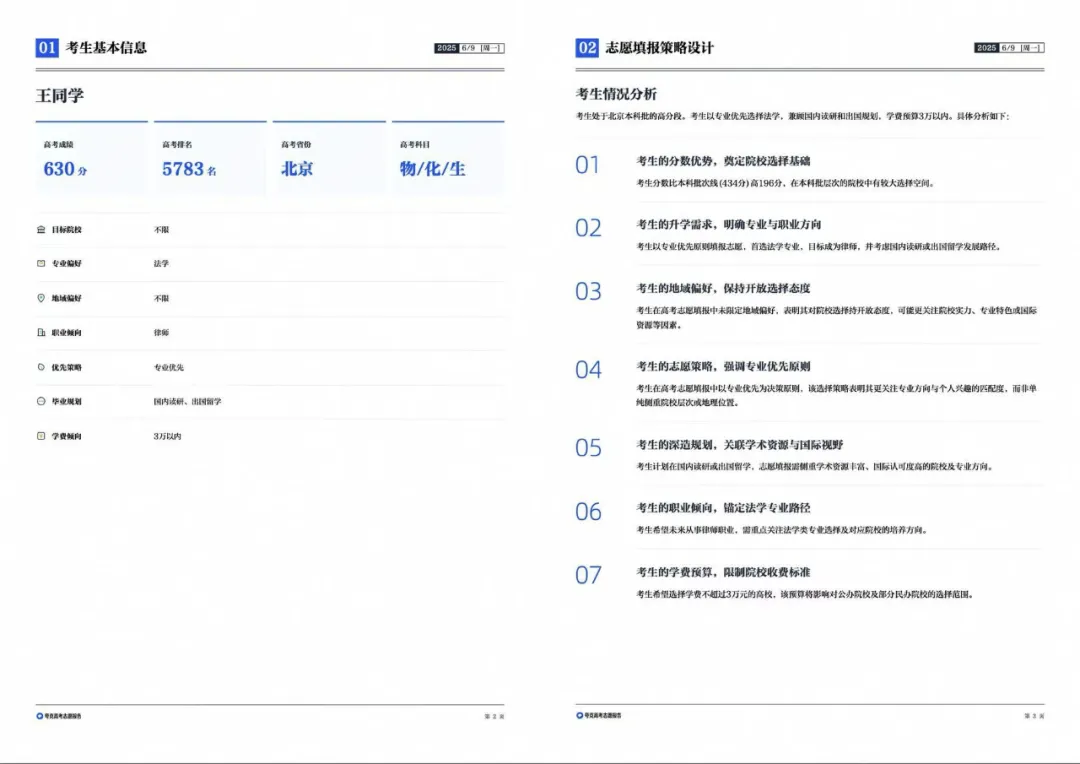
从报告的结果上看,它能够理解我在法学上的偏好,并且结合 985、211 院校和特色学科展开有梯度的规划。
它还能把城市、学费以及专业就业等情况进行分析,融入到所推荐的学校和专业里,可以让考生更清晰地掌握所有信息,而非简单的大学和专业信息。
有数据显示,每年只有 2% 的考生会选择进行线下咨询。那么对于 98% 的考生来说,夸克的出现,让更多考生不再被地域和费用困扰,志愿填报的信息差越来越小。
除此之外,在高考深度搜索功能的加持下,即使是一些开放性并且高度口语化的描述,夸克也能给出更符合现实的参考建议,
例如,笔者使用「山东物化生男孩,647 分,推荐可以上去的 985 学校,可以中外合作办学,以后想考研或者出国留学,做一下志愿填报」作为提示词,体验了一次高考深度搜索能力。
在这个提示词下,夸克首先会解析考生的核心诉求——分数、选科、兴趣、地域偏好,然后在其庞大的高考知识库中进行多维度匹配和推理。这个知识库不仅包含了历年的院校录取数据、专业信息、就业率、深造率等结构化数据,还融入了大量关于行业发展趋势、专业与职业关联性的非结构化知识。
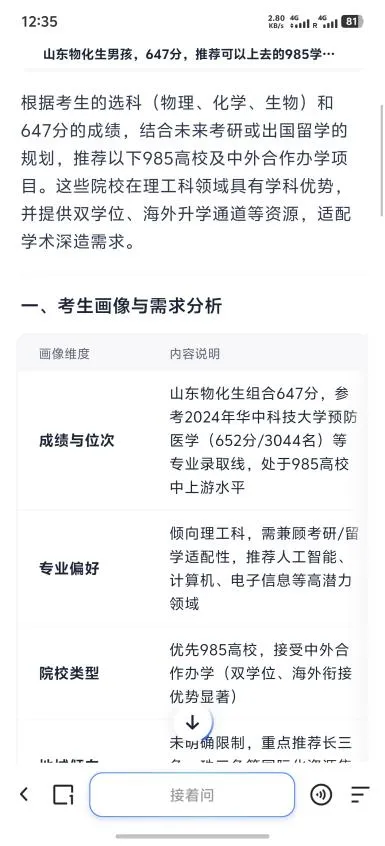
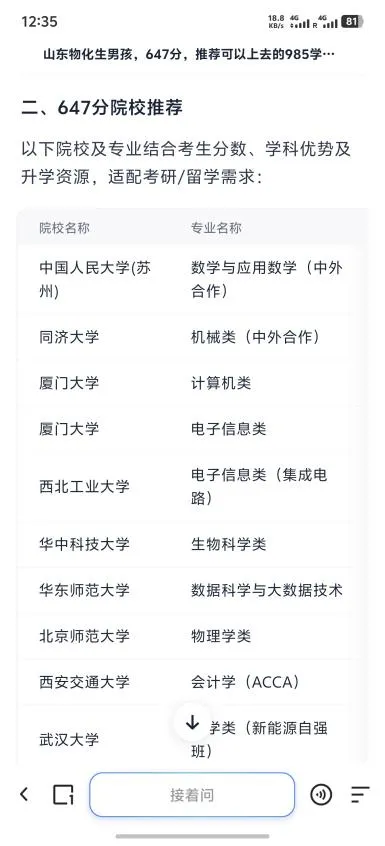
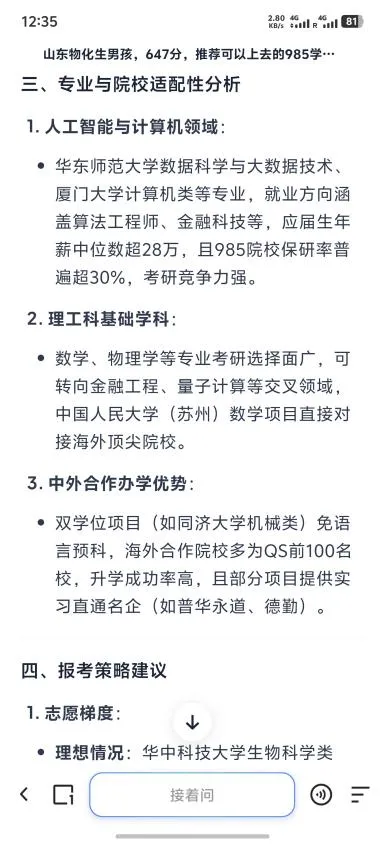
02 「 专家 大脑 」 是如何炼成的
为了让这些前端的用户体验更加准确,夸克今年选择进一步下注在 AI 模型能力的拓展上,算力投入激增 100 倍。
虽然是基于通义千问,但夸克高考志愿大模型并非简单地对通用模型进行微调,而是通过由高考志愿专家真人判别价值、引导的策略精化机制,让模型做到真正「像志愿专家一样思考给出建议」。
要实现这一目标,夸克首先要让 AI 学会模仿真人专家的「思维链」。在指令微调阶段,研发团队将数百名资深高考志愿规划师与考生、家长的多轮真实对话进行结构化处理,提炼出完整的分析路径与沟通语言风格。这些包含了上万条真实专家「推理链」的高质量监督数据,成为大模型学习人类专家分析过程的「教材」。
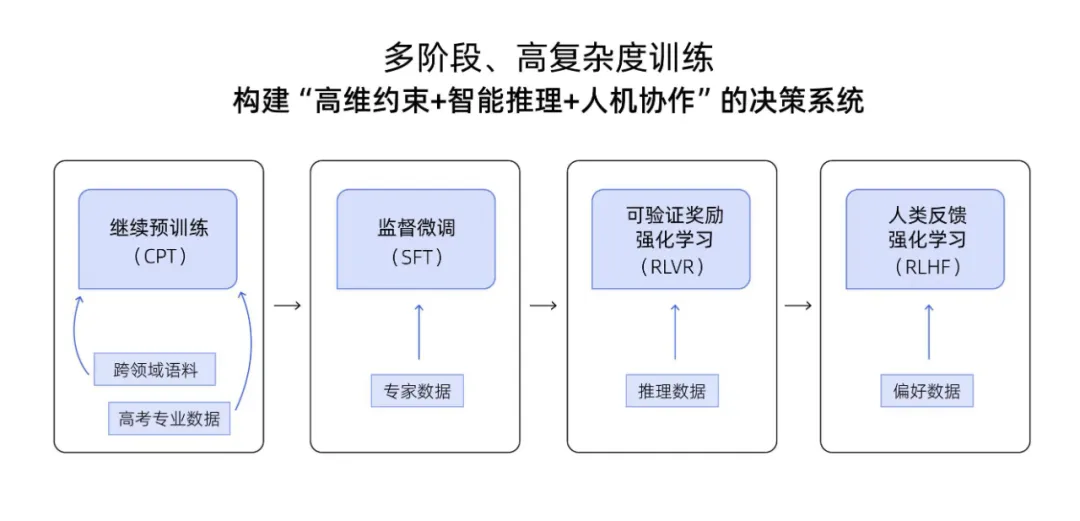
这一点上,夸克展现了其核心优势。「夸克的数据来源于官方考试院发布的权威资料,如同业内公认的『大厚本』,」参与夸克 AI 志愿模型训练的专家任老师强调,这与许多依赖网络爬取未经证实旧数据的大模型形成鲜明对比,从根本上杜绝了「500 分考生被推荐 985 院校」这类荒谬的 AI 幻觉,确保了推荐结果的准确性与权威性。
03 时代脉搏
从「AI 高考志愿大模型是如何炼成」之中,相信你也发现这样一个根植于具体应用场景的大模型能够为考生产出准确的结果,少不了真人高考志愿专家的帮助。
每年高考季,我们更多看到类似张雪峰这样专业的志愿辅导专家,但在现实中,针对焦虑的学生以及家长,仍然充斥着众多质量难以得到保障的「志愿填报导师」。
之所以这些服务每年仍能大行其道,是因为志愿填报的意义已远超「选学校、选专业」,已经演变为整个家庭参与其中的「人生第一次职业规划」。甚至可以说已经成为了每年数千万考生共命运的「时代脉搏」。
然而,张雪峰所代表的,是金字塔尖的昂贵解决方案。一个张雪峰,精力终究有限,其服务注定是少数人的「奢侈品」。而在他身后,是一个更加庞大且良莠不齐的市场,无数打着「专家」旗号的机构和个人,用着质量难以保障的服务,收割着同样焦虑却无法触及顶尖资源的普通家庭。
如果说张雪峰的核心壁垒是其个人经验和信息积累,那么夸克的打法是通过高考志愿大模型,将数百名资深规划师的决策逻辑与经验进行「内化」,再结合国内最大、实时更新的高考知识库,试图将过去依赖个人、昂贵且非标的「专家服务」,转变为每一个普通人都能免费拥有的标准化、高质量「AI 顾问」。
有人说夸克这次上线的 AI 志愿填报工具,是「要掀翻桌子」,其实不够准确。它不是在掀桌子——它是在换一张更大的桌子,让更多人坐得上来。这张桌子不需要预约、不收咨询费。你只要能打开手机、填个档案,它就能给你一份真正有逻辑、有数据的志愿报告。
在这张桌子上,凉山的考生和杭州的考生看到的是一样的报告结构,一样的专业维度,一样的推荐逻辑。他们的起点被 AI 拉得更近了一点。高考是改变命运的机会,而技术的意义,就是让「机会」变得更公平一点。这样的机会从来就不该只放在一张 VIP 金卡的桌子上。
夸克在 6 月 12 日发布会上首次公开的用户数据为此做出了最好的注脚——其高考服务已累计帮助 1.2 亿用户,其中三线及以下城市的用户占比超过 50%。
免责声明:本文章仅代表作者个人观点,不代表本平台的立场和观点。本文章仅供信息分享,不构成对任何人的任何投资建议。用户与作者之间的任何争议,与本平台无关。如网页中刊载的文章或图片涉及侵权,请提供相关的权利证明和身份证明发送邮件到support@aicoin.com,本平台相关工作人员将会进行核查。



